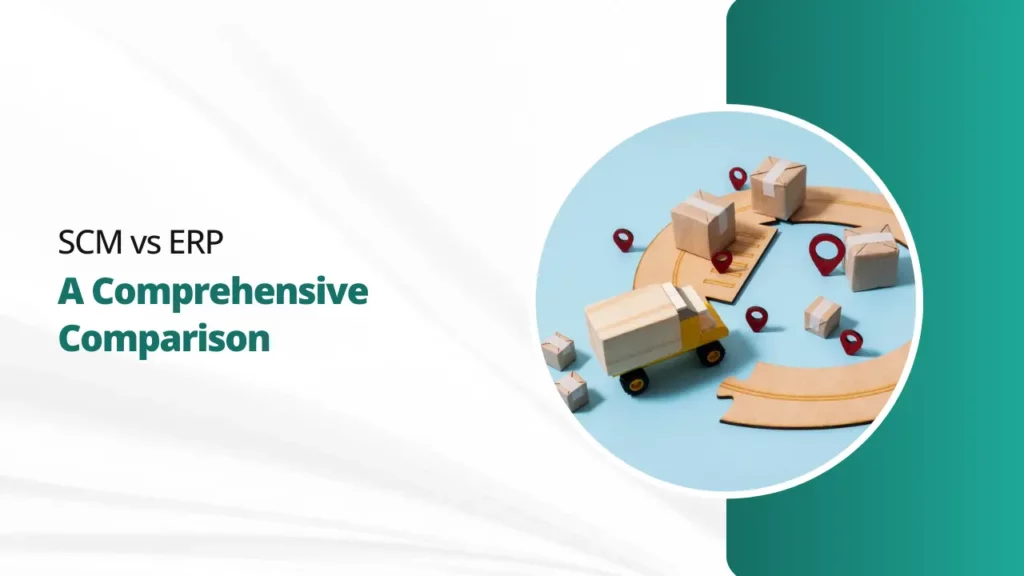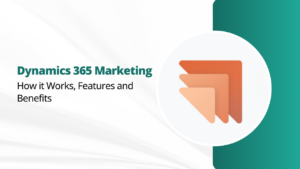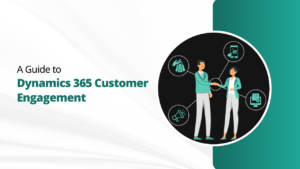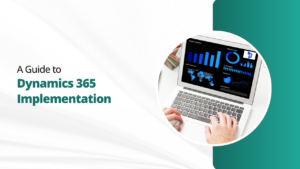ERP (Enterprise Resource Planning) and SCM (Supply Chain Management) are essential business software systems. However, they differ in scope and focus. ERP is like a command centre integrating various business functions into a single platform. This includes finance, accounting, human resources, manufacturing, and customer relationship management (CRM). At the same time, SCM is like a specialized traffic controller that manages the flow of goods from suppliers to customers.
In the blog about SCM vs ERP, we will discuss the intricacies of SCM and ERP. We will also discuss insights to help businesses make informed decisions about their operations.
SCM and ERP
SCM is the engine that drives the flow of goods and information across the entire production and distribution spectrum. From sourcing raw materials to delivering finished products, SCM optimizes every step. It has a role in reducing costs, improving efficiency, and enhancing customer satisfaction. This external-facing system ensures that businesses stay agile in an ever-changing market.
On the other hand, ERP is often touted as a holistic solution that integrates various business processes into a unified system. ERP goes beyond individual departmental silos and enhances collaboration by providing real-time data and insights. It streamlines internal processes across finance, human resources, manufacturing, etc. ERP is the nerve centre of an organization that improves its operational excellence.
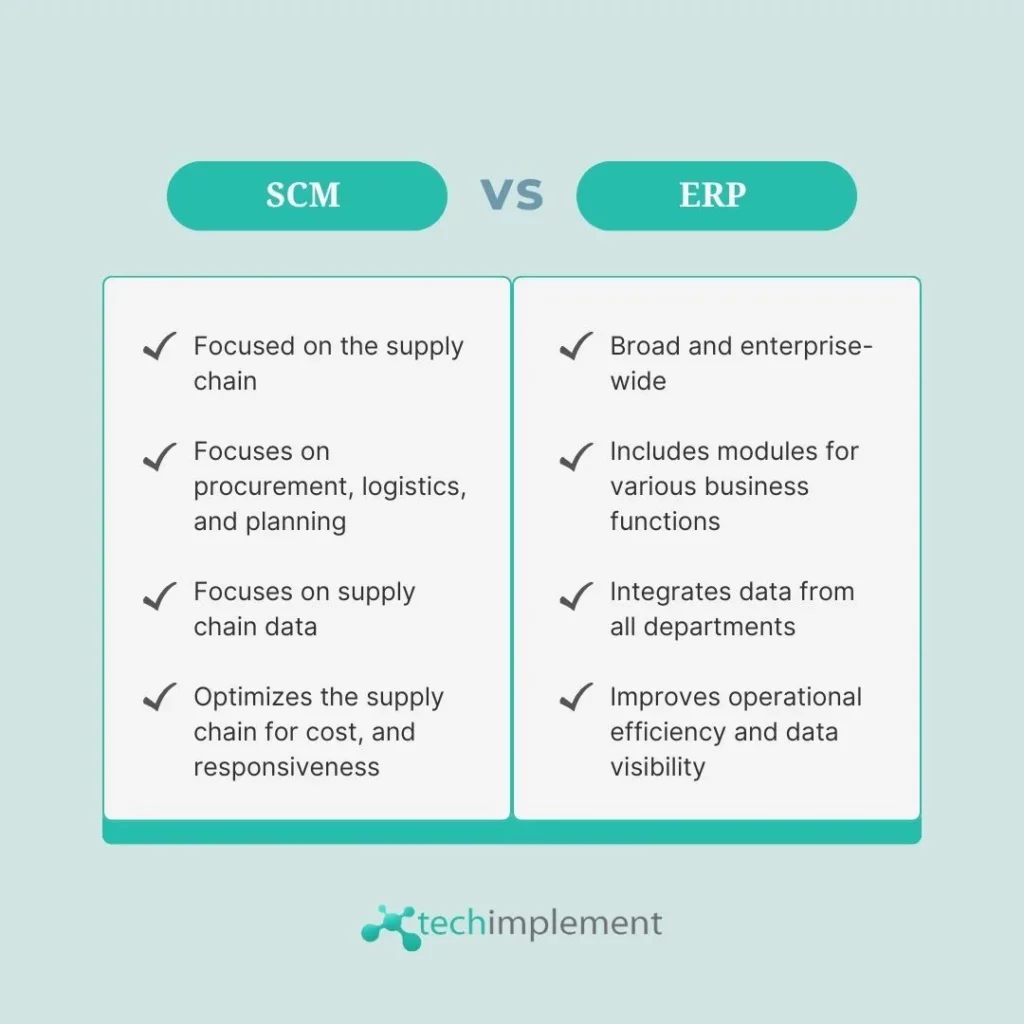
Operational Dynamics: SCM vs ERP
When it comes to operational dynamics, both SCM and ERP play crucial roles. But they operate in different spheres and contribute to various aspects of your business. Here’s a deeper dive into their operational dynamics:
SCM:
Directing the flow of goods and information through your supply chain network. This includes activities like:
- Procurement: Sourcing materials and components from suppliers
- Inventory Management: Optimizing inventory levels to avoid shortages or overstocking
- Logistics: Planning and managing transportation and warehousing
- Production Planning: Coordinating production schedules with raw material availability and customer demand
- Order Fulfillment: Ensuring timely and accurate delivery of products to customers
Operational Dynamics:
- Relies heavily on real-time data and analytics to make informed decisions about inventory levels, logistics, and production planning.
- Promotes visibility across the entire supply chain, enabling better collaboration and risk management.
- Allows businesses to adapt quickly to changing market demands and disruptions.
- Manages supply chain processes, optimizing costs and improving overall efficiency.
ERP:
Integrating and streamlining all core business functions within the organization. This includes activities like:
- Finance and Accounting: Managing financial transactions, accounts payable and receivable, and financial reporting.
- Human Resources: Managing payroll, employee benefits, and recruitment.
- Manufacturing: Planning and managing production processes, resource allocation, and quality control.
- Sales and Marketing: Managing customer relationships, orders, and marketing campaigns.
- Customer Service: Providing efficient and responsive customer service.
Operational Dynamics:
- Acts as a central hub for all business data, improving data accuracy and consistency.
- Automates routine tasks and workflows, enhancing efficiency and productivity.
- Facilitates collaboration and communication between departments by providing a single source of truth for data.
- Generates valuable business insights through data analysis, enabling informed decision-making.
Interplay between SCM and ERP:
While they have distinct operational focuses, SCM and ERP work best when integrated. Here’s how they complement each other:
- Real-time information about inventory levels, production schedules, and delivery times from SCM systems can be used by ERP to optimize financial planning, resource allocation, and customer fulfilment.
- Data from ERP about sales forecasts, customer orders, and production capacity can be used by SCM systems to optimize procurement, inventory management, and logistics planning.
SCM vs ERP: Choosing the Right Business Backbone
Selecting the right backbone for your business, whether SCM or ERP, requires a strategic lens. Both solutions offer distinct advantages. The optimal choice hinges on your specific needs and long-term vision. Let’s see the strategic insights that guide this crucial decision:
Understanding Your Business :
- Industry Landscape: Analyze the dynamics of your industry. Does it prioritize agility and responsiveness (e.g., e-commerce) or operational efficiency and cost control (e.g., manufacturing)?
- Business Size and Complexity: Consider your company’s size and operational complexity. Do you require a comprehensive suite like ERP to manage diverse functions, or is a focused SCM solution sufficient?
- Growth Trajectory: Anticipate your future growth plans. Will your supply chain need to scale rapidly, or will internal process optimization be paramount?
Aligning with Strategic Goals:
- If customer satisfaction is your primary focus, prioritize real-time visibility and responsiveness provided by SCM.
- If streamlining internal processes and maximizing efficiency are key, an ERP system’s integrated platform might be the better fit.
- If adapting to market changes quickly is crucial, prioritize solutions that offer adaptability and data-driven insights. These are present in both SCM and advanced ERP offerings.
Strategic Considerations:
- Assess your need for seamless data flow between various business functions. If silos exist, an ERP system can bridge the gap, while advanced SCM solutions may integrate well with existing ERP platforms.
- Choose a solution that can grow with your business. Cloud-based options offer scalability and flexibility. On-premise solutions might provide greater customization control.
- Consider the resources and time required for implementation and training. ERP often demands greater investment upfront, while SCM implementations can be quicker and less disruptive.
Conclusion:
In the SCM vs ERP debate, there is no one-size-fits-all solution. The key lies in understanding the unique needs of your business and selecting the system that aligns with your goals. Our comprehensive guide aims to provide you with the knowledge needed to make decisions. This paves the way for operational excellence and sustained business success.
Start your journey with us as we unlock the potential of SCM and ERP. We will guide you through the options to find the perfect fit for your business needs. Contact us to learn more!
FAQ:
Is the supply chain an ERP?
Supply Chain Management (SCM) is a subset of ERP, focusing specifically on efficiently managing the flow of goods and services.
What is the relationship between ERP and SCM for the logistics market?
ERP integrates various business processes, while SCM specifically manages the logistics aspect.
What is the role of SCM in ERP?
The role of SCM in ERP is to handle the logistics, procurement, and distribution components within the larger ERP system.
How do ERP and SCM complement each other?
ERP integrates diverse processes, while SCM focuses on optimizing the supply chain.

